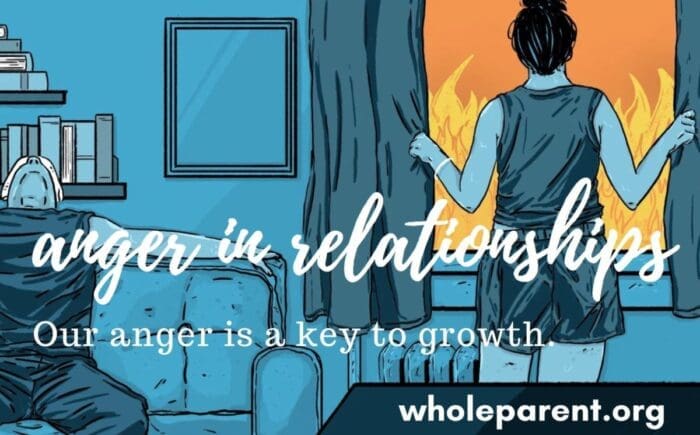Anger is not easy for any of us.
I have a problem with rage. When a partner gets mad, that’s usually okay. It’s hard, but it’s no longer scary. When a partner yells, however, all kinds of self-defense mechanisms kick in and begin to cloud my rational response into something more childlike. Anger in any form is part of the ebb and flow of life. In a relationship, if you’re not allowing yourself to get angry and express that frustration, you’re going to be pushing it under the carpet. At some point, the anger is going to come out. By learning to deal with anger in rational and connective ways with your partner, you can go a long way towards future-proofing your relationship from the major blowups. That’s the goal, anyway.
+++ Listen to this article on the podcast Love on the Air +++
+++
The Dance of Anger Between Men and Women
We all deal with anger differently. Most of our primal reactions to anger come from when we were children and experienced anger for the first time. Anger, directed at a child, usually meant we were doing something wrong. Anger meant we were bad in some way. Anger was frightening and upset our feelings of safety and attachment. When someone is angry with you and expressing it, it is very hard to stay connected and open. Most of us want to shut down, run, or yell back. Most of us want to make it stop. But we’ve got to find a way through the anger, together, to process it, and get underneath what’s making us/them so angry, so we can start to heal.
My Earliest Memories of my Father’s Anger
As a man, I was victimized by my father’s anger. When he got mad he yelled, threw stuff, and in a few cases, hit me. I learned very early, however, that my dad’s anger was dangerous. My earliest memory of my father’s rage had to do with a road trip back from the coast. My brother, 8 years older, had forgotten to unlock the 4-wheel-drive hubs on the Jeep and had driven back the 4 hours, doing some unknown damage to the car. My dad was tired, drinking, and yelling like he was going to kill my brother. As a 3-year-old boy, I was unable to process this information. And, in this case, the other people in the room, my family, were unable to shield me from this fire of abusive language and threat of violence.
In recounting the story my mom recalls vividly, “I thought he was going to kill my son.” She tried to stop my father and in some flurry of swats, my dad actually clipped my mother on the brow and cause her to bleed a bit. Also in the room were my brother, the victim. And my older sister, also terrified and paralyzed by the furious attack on her younger brother. The scene was out of control. And the 3-year-old me was left in the center of the storm, unable to process, unable to find comfort in the arms and shelter of one of his people, and unable to hide from the fire.
At that moment, at 3-years-old, I learned to disassociate with my own feelings. And more critically, disassociate from my feelings of fear of someone else’s anger. I was left to my own thoughts and terror. I’m not sure what I did at that moment to soothe myself, but I’m guessing I left my body and mind behind and tried to find a place with God to comfort me. It didn’t work. My dad continued to scream, my mom and sister continued to cry, and my brother continued to fear for his life. It was a snapshot of my imprinting around anger, self-defense, self-soothing, and self-preservation. I learned to leave my body and mind when I was faced with someone else’s rage.
Men and Our Anger
Men are often the target of violence at an early age. We learn that men go to war and fight evil and get killed. We learn to toughen up so we’re not seen as sissies. We learn that anger is a form of self-defense and rage can be used as a weapon or a persuasive tool. Anger is not easy for men to process. We’re not good at understanding what makes us SO angry. And we’re not good at processing anger when it is directed at us.
When anger is directed at us from a man we have certain reactions that are specific. In my case, when a man gets angry with me (yelling or not) I begin to feel like a small boy. I feel like I am powerless to stop the anger. I have an unconscious sense that this man is going to hit me, kill me, and kill my family if I don’t fight him to the death. This all happens in seconds when a man raises his voice to me. I learned to fight or run.
Women and Anger
Women have a different response to anger, generally. According to The Dance of Anger, a seminal book on the topic
“Anger is a signal and one worth listening to,” writes Dr. Harriet Lerner in her renowned classic that has transformed the lives of millions of readers. While anger deserves our attention and respect, women still learn to silence our anger, to deny it entirely, or to vent it in a way that leaves us feeling helpless and powerless.
Anger In Our Professional Life
In the business world, anger doesn’t come frequently, but when it does it’s scary and hard to manage. I have quit jobs over raging bosses. I have been shouted at by colleagues. I have given in to my rage and shouted back at a colleague during a stressful project. I don’t do well with anger in the workplace. I regress to a child-like fear-state, and I see the aggressor as my raging dad. That’s not accurate, but that’s how it feels to me in the moment.
In my professional career I have known several ragers. Each one of them taught me a lot about myself and my fear of anger. I have grown as a result of these encounters, and I have begun to heal my anger wound, even in the workplace. Today, if I am given an opportunity to work with someone and they flick in and out of anger, I simply state my boundaries, “I won’t be talked to like that.” And if the person doesn’t immediately stop, I leave. No job is worth being victimized by someone’s unresolved anger issues. Sure, mine are unresolved to some extent as well, but I’m not interested in working on it with a boss or colleague.
Anger In Our Love Relationships
Love is where I’ve learned the most about my own anger, and how to deal with another person’s anger. In my two marriages, I had a lot of opportunities to grow in this aspect of my life. Both of my wives had temper issues. (Hmm. I need to look at why I choose women with anger issues.) Here are the main things I learned about processing anger in a love relationship.
- I may be the trigger
- I do not have to be the target
- I will not accept rage and yelling in any form
- Your anger is your own
- Both of us are responsible for our own anger and our reactions to anger
- We must process the anger with someone else
- When we do have outbursts we must be responsible for our own actions
- After the storm, both partners should be looking for the repair
- Repair does not have to come immediately
- Repair is essential to rebuilding the bridge of trust that was burned down by the anger
- After the repair, anger may still linger, it is up to each of us to process our own anger
As anger burns the trust between us, it is up to both of us to separate and do some healing/processing and come back together at a later date to repair the damage. While it is most appropriate for the rager to ask for the repair and rejoin, either partner can ask.
Repairing After an Angry Moment
Hear This: Healthy expression of anger is essential to building a lasting and trust-filled relationship. Burying your anger under complacency leads to indifference and isolation. Eventually, if you do not process your anger with your partner, you blow up in other ways. In my case, my 2nd wife got so angry, she stayed angry 24/7 for over a year. I did not have the tools at that time to protect myself or negotiate a truce. We were stuck in the dance of anger for a long time. And for her, the resolution, the way out, was to ask for a divorce.
It would’ve been healthier and more honest if my then-wife could’ve processed a bit of her anger with me instead of projecting her anger on to me. Her unresolved anger still keeps her from having any kind of relationship with me. She stopped co-parenting about four years ago, and today, we barely speak. But the rage is still there. I can taste it when I ask for anything.
Anger is a way to manipulate your partner into doing something they may not want to do. In our case, my then-wife wanted me to go back to a 60-hour-a-week job so she could keep the stay-at-home-lifestyle we had agreed to when the kids were born. Her rage at me for even asking the question about work/life balance, about money versus health, caused a fracture between us, that kept her angry and sullen up until the time she went to see an attorney about divorcing me. She was a planner.
When Anger Goes Unresolved An Explosion Is Forthcoming
My then-wife went quiet for a few weeks. She seemed more placid. Not un-angry, but resolved about something. I noticed a chill in the air. We had started marriage counseling, for a second time, and were working through our communication issues. I was hopeful. She admitted she was cynical. She did not believe the counseling was going to get her needs met now or in the future.
When she decided she wanted a divorce, wanted to change the circumstances that were keeping her so mad and unhappy, she failed to talk to me about it. She was raging, but she was raging without cause or resolution. If you just stay mad you can’t work it out. If I am the cause of all of my ex-wife’s anger, where is her part in the problem?
She asked a lawyer about divorcing me. She should’ve asked our marriage therapist about how to tell me what she was so angry about. She turned to the escape clause of divorce. She asked for the divorce brochure and got the answers she was hoping to find. She could have the house, the kids, and the money. It must’ve felt like an easier choice, somehow, than staying and actually processing what she was rageful about.
Our Anger is Our Own
We can and will get mad at other people. What we do with that anger is 100% up to us. Learn to love your anger and what it is teaching you about yourself, your past, and how you want to move forward in the future. Anger comes up when expectations are not met. Anger comes up when commitments are not met. Anger will come up in your romantic relationships and your ability to discuss and resolve that anger WITH your partner will go a long way towards keeping you in the relationship rather than looking for the exit.
Always Love,
John McElhenney – life coach austin texas
Facebook | Instagram | Pinterest | @wholeparent
Get the complete single dad story with John’s new book: Single Dad Seeks (available in all formats)
More posts on anger from The Whole Parent:
- The 5 Laws of Anger in Divorce and Co-Parenting
- Rationalizing Your Divorce: Anger is Anger is Anger is…
- The New Dance of Anger: Men and Our Legacy (part 2)
You can find all of my books on AMAZON.





